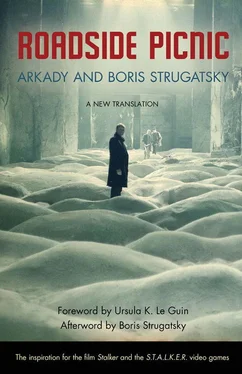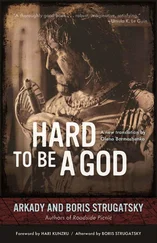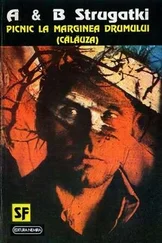If I did, after all, decide to publish here even a simple list of pertinent documents with a brief description of each one, this list would look approximately like this:
04/30/75 A→B (the editors have “serious doubts” about RP)
05/06/75 A letter from A&BS to Medvedev with a request for an editorial response
06/25/75 A letter from Ziberov explaining the delay
07/08/75 The editorial response from Medvedev and Ziberov
07/21/75 A reply from A&BS to the editorial response
08/23/75 B→A (the anthology was touched up and sent to the editors back in July)
09/01/75 A notification from Ziberov acknowledging receipt of the manuscript
11/05/75 A letter from Medvedev rejecting the Picnic
11/17/75 A letter from A&BS to Medvedev arguing against the rejection
11/17/75 A letter from Medvedev to B expressing perplexity
01/08/76 A letter from A&BS to Poleschuk with a complaint about Medvedev
01/24/76 A notification from Parshin acknowledging the receipt of the letter to the CC AULYCL
02/20/76 A letter from Parshin about measures taken
03/10/76 B→A (proposing letters to Parshin and Sinelnikov)
03/24/76 A letter from A&BS to Parshin with a reminder
03/24/76 A letter from A&BS to Sinelnikov with a reminder
03/30/76 A letter from Parshin about measures taken
04/05/76 A→B (suggesting a letter to higher authorities)
04/12/76 A letter from Medvedev rejecting the Picnic
And so on, so forth. Who needs this today, and who today would read it?
But if not this, then what is there left to write about? Without this tedious/boring list and the gloomy/spiteful commentary on it, how do you tell the story of publishing the Picnic— a story that is in a certain sense almost mysterious? Because this novel probably wasn’t without its flaws, but at the same time it was also not without evident merits: it was clearly gripping, capable of making a reasonably strong impression on a reader (it did, after all, inspire a remarkable reader like Andrei Tarkovsky to make an outstanding film); at the same time it certainly didn’t contain any criticism of the existing order and, on the contrary, seemed to be in line with the reigning antibourgeois ideology. So then why, for what mysterious—mystical? infernal?—reasons was it doomed to spend more than eight years passing through the publishing house?
At first, the publisher didn’t want to enter into a contract about the anthology at all; then it did but for some reason revolted against the novel Dead Mountaineer’s Hotel; then it seemed to agree to replace Dead Mountaineer’s Hotel with the previously approved novel Hard to Be a God, but then it categorically revolted against the Picnic. … It’s impossible here to even give a brief account of this battle; it turns out to be too long—it was eight years, after all. There were unexpected repudiations of the publisher’s own demands (suddenly, for no reason at all, down with Hard to Be a God!) and five or six renewals of the contract, and even sudden attempts to break off the relationship entirely (all the way up to court!). But mainly, and the whole time, and obstinately and invariably, from one year to the next, from one conversation to the next, from one letter to the next: take the reanimated corpses out of the Picnic; change Redrick Schuhart’s language; insert the word “Soviet” when talking about Kirill Panov; get rid of the bleakness, hopelessness, coarseness, savageness…
I’ve preserved a remarkable document: the page-by-page comments on the novel Roadside Picnic by the language editors. The comments span eighteen (!) pages and are divided into sections: “Comments Concerning the Immoral Behavior of the Heroes,” “Comments Concerning Physical Violence,” and “Comments About Vulgarisms and Slang Expressions.” I can’t allow myself not to produce a couple of excerpts. And keep in mind: I am in no way selecting quotes, not looking for idiocies on purpose; I’m presenting the comments in order, beginning with a paragraph from the explanatory letter that accompanied the pages:
Of course, we [the editors] only copied out those expressions and words that, in our opinion, require either removal or substitution. These comments are first and foremost dictated by the fact that your book is intended for teenagers and young people, for members of the Young Communist League who see Soviet literature as a textbook on morals, a guidebook to life.
COMMENTS CONCERNING THE IMMORAL BEHAVIOR OF THE HEROES
[there are 93 comments in all; the first 10 are presented]
must stick your fat ass—p. 21
I’ll walk on my teeth, never mind my hands—p. 21
crawling on all fours—p. 32
take out the flask, unscrew it, and attach myself to it like a leech—p. 35
suck the flask dry—p. 35
I need just one more sip—p. 35
I’ll get plastered tonight. I gotta beat Richard, that’s the thing! The bastard sure knows how to play—p. 38
And I need a drink—I just can’t wait—p. 42
I would have been happy to drink with you to that—p. 42
…without saying a word pours me a shot of vodka. I clamber up onto the stool, take a sip, grimace, shake my head, and take another sip—p. 43…
COMMENTS CONCERNING PHYSICAL VIOLENCE
[there are 36 comments in all; the last 9 are presented]
grabbed a heavy beer stein from the bar and smashed it with all his might into the nearest roaring mug—p. 179
Redrick felt in his pocket, picked out a nut that weighed about an ounce, and, taking aim, flung it at Arthur. It hit him right in the back of the head. The boy gasped [etc.]—p. 182
Next time I’ll knock a couple of teeth out—p. 182
kicked Redrick in the face with his free leg, and wriggled and flopped around [etc.]—p. 185
convulsively kneading the head of this damned kid with his chest, couldn’t take it anymore and screamed as hard as he could—p. 185
Now that cute little face appeared to be a black-and-gray mask made of ashes and coagulated blood [etc.]—p. 185
Redrick threw him facedown into the largest puddle—p. 186
may those bastards suffer, let them eat shit like I did—p. 202
He hit himself hard in the face with a half-open fist—p. 202
COMMENTS ABOUT VULGARISMS AND SLANG EXPRESSIONS
[there are 251 comments in all, an arbitrary 10 from the middle are presented]
he suddenly began to curse, impotently and spitefully, using vile, dirty words, showering Redrick with spittle…—p. 72
Put in your teeth and let’s go—p. 72
the Butcher cursed—p. 74
You’re scum…. A vulture—p. 74
asshole—p. 76
I’m dying of hunger!—p. 77
The Monkey was dozing peacefully—p. 77
he was dirty as hell—p. 78
To hell with this!—p. 82
beeped at some African—p. 85…
I remember that upon receipt of this amazing document, I rushed straight to my bookshelves and joyously brought forth our beloved and unsurpassed Jaroslav Hašek. With what unutterable delight did I read:
Life is no finishing school for young ladies. Everyone speaks the way he is made. The protocol chief, Dr. Guth, speaks differently from Palivec, the landlord of The Chalice, and this novel is neither a handbook of drawing-room refinement nor a teaching manual of expressions to be used in polite society….
It was once said, and very rightly, that a man who is well brought-up may read anything. The only people who boggle at what is perfectly natural are those who are the worst swine and the finest experts in filth. In their utterly contemptible pseudo-morality they ignore the contents and madly attack individual words.
Читать дальше












